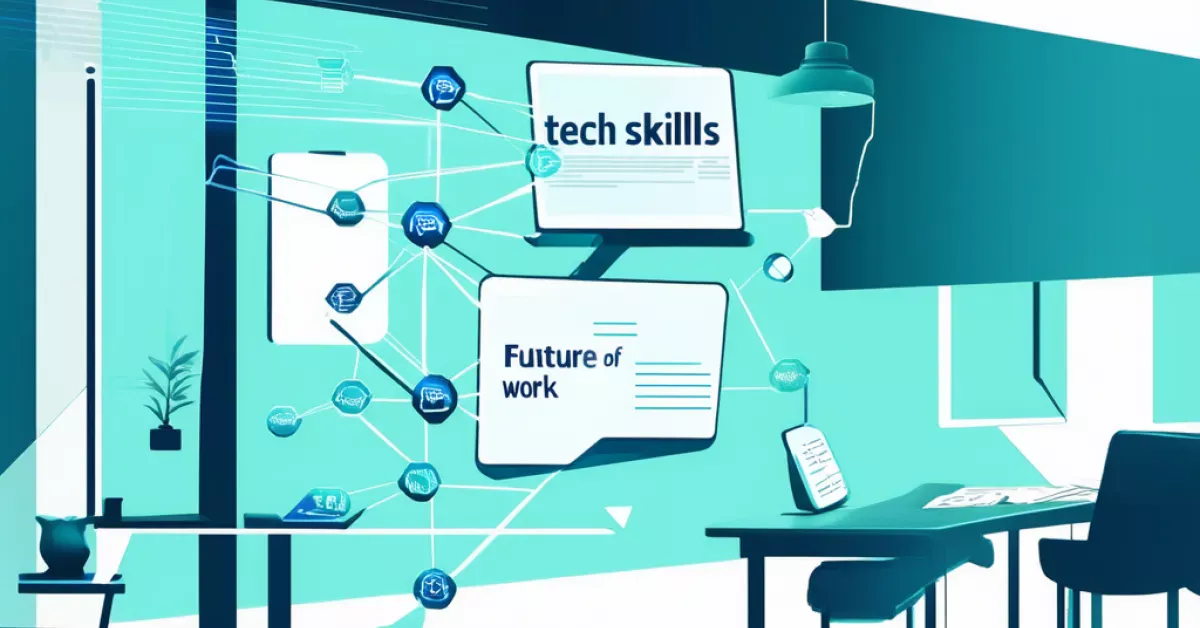In the modern world, keeping up with technological change is crucial for any ambitious professional. The future of work is evolving rapidly, driven by the rapid pace of technological advancements. Understanding these changes and equipping ourselves with necessary skills will open doors to exciting opportunities in this digital age. This article explores the essential tech skills that every professional in Australia and beyond should master.

Evolving Landscape of the Future of Work
Technological Advancements and Job Roles
Technology has transformed every aspect of our lives, including the workplace. From the introduction of artificial intelligence to cloud computing, tech innovations are reshaping job roles across all sectors. This means that traditional job descriptions are evolving, incorporating tasks that require new tech skills. As automation and machine learning become more prevalent, roles that were once strictly human are now shared with machines, making it vital for professionals to adapt and learn how to use these technologies effectively.
Shifting Responsibilities in the Digital Age
As workplaces become more digital, responsibilities are also shifting. Professionals must now be adept at using various technologies to perform their job functions efficiently. The digital age demands a high level of digital literacy, where understanding and using digital tools becomes as basic as reading and writing. This shift means that employees must take on more proactive roles in incorporating tech into their daily tasks.
Crucial Tech Skills for Thriving Professionals
Importance of Digital Literacy
In today’s job market, digital literacy is crucial. It’s not just about knowing how to use a computer but understanding how to responsibly manage, manipulate, and communicate online data. Professionals need to be familiar with basic software like word processors and spreadsheets, but they also need to be adept at using more advanced tools like data analytics software. This ensures that they remain competitive and adaptable to the rapidly changing digital landscape.
Rapid Changes in the Digital Age
The digital age is characterized by rapid technological advancements. New tools and platforms emerge frequently, and it’s essential for professionals to keep up with these changes. Continuous learning and adaptation are necessary to remain relevant. Workers who embrace these changes with a positive attitude and a willingness to learn will find more significant opportunities for innovation and growth.
Building a Future-Ready Skillset
Creating a future-ready skillset involves focusing on both hard and soft skills. Tech proficiency should be paired with skills like problem-solving, critical thinking, and adaptability. Learning how to code, understanding data analytics, and being able to develop applications can set professionals apart in the workforce, but so can the ability to work well in teams, manage projects, and communicate effectively.
Essential Technology Trends Impacting the Job Market
Artificial Intelligence and Machine Learning
Artificial Intelligence (AI) and Machine Learning (ML) are transforming the job market by automating tasks and providing insights through data analysis. These technologies are not only creating new jobs but also replacing some routine tasks in existing roles. Professionals need to understand how AI can be applied in their fields and how it can be used to enhance productivity and innovation. Familiarity with AI platforms or even basic coding can offer a significant advantage in many industries.
Blockchain and Its Implications for Professional Development
Blockchain, primarily known for its role in cryptocurrency, is making waves across various sectors due to its ability to provide secure, transparent transactions. Beyond finance, it’s being explored in fields like supply chain management and healthcare for keeping records secure and transparent. Familiarity with blockchain concepts can enhance a professional’s portfolio, opening up opportunities in industries seeking to leverage this technology for better efficiency and trust.

Exploring the transformative impact of AI and Blockchain on career paths and professional practices.
Mastering Tech Tools for Enhanced Productivity
Tools for Innovation and Career Growth
Mastering tech tools can significantly improve work efficiency and open up paths for career growth. Applications like collaboration software, cloud services, and project management tools are essential. Tools like Slack, Trello, and Microsoft Teams help streamline communication, while others like Google Cloud and AWS offer powerful resources for data handling and collaboration.
Staying Competitive in Today’s Environment
In today’s competitive environment, simply having tech skills isn’t enough. Professionals must stay updated with the latest tools and trends. This involves not only learning new platforms but also understanding how to leverage these tools to improve business outcomes. Being tech-savvy can set you apart from others, making you a valuable asset to any employer.
Integrating Tech Solutions into Daily Work
Integrating tech solutions into daily work routines is essential for enhancing productivity. This could involve using automation tools to handle repetitive tasks, employing project management software for effective teamwork, or using analytics tools to make data-driven decisions. The right tools can help save time, reduce errors, and allow professionals to focus on more strategic aspects of their roles.
Rise of Remote Work: Digital Communication & Collaboration
Importance of Digital Communication Platforms
With the rise of remote work, digital communication platforms have become indispensable. Tools like Zoom, Skype, and Teams have made it possible for teams to stay connected, regardless of their physical locations. Understanding how to use these platforms effectively is crucial for maintaining productivity and teamwork in a remote setting.
Collaboration Tools for Effective Team Dynamics
Collaboration tools are vital for modern team dynamics, ensuring everyone can contribute effectively regardless of location. Platforms such as Slack and Trello facilitate real-time communication and task management, helping teams stay organized and maintain a smooth workflow. Familiarity with these tools allows professionals to collaborate more effectively, fostering innovation and teamwork.

Illustrating the essential role of digital platforms in remote teamwork.
Maintaining Workplace Readiness with Emerging Tech
Staying Updated with Technology Trends
To maintain workplace readiness, professionals should remain updated with emerging technology trends. This means keeping an eye on industry news, attending workshops, and perhaps even obtaining certifications in relevant tools or concepts. Engaging with tech communities and forums can provide insights and practical knowledge about the latest developments.
Enhancing Tech Proficiency for Professional Development
Improving tech proficiency is crucial for professional development. Taking online courses, attending webinars, and participating in tech-focused discussions can help bridge the gap between current knowledge and new advancements. This continuous learning approach ensures that professionals remain productive and valuable in a tech-driven marketplace.
Building a Robust Set of Professional Skills
A robust skill set combines both technical and interpersonal skills. While mastering technology is essential, soft skills like communication, leadership, and adaptability remain equally important. Professionals who can seamlessly blend technical know-how with strong interpersonal skills are better equipped to tackle challenges in the workplace and drive meaningful change.
Significance of Online Security in the Digital Age
Data Privacy as a Fundamental Component
In the digital age, online security and data privacy are non-negotiable. Professionals need to be aware of how to protect sensitive information from cyber threats. This involves understanding basic cyber hygiene practices such as using strong passwords, accessing secure networks, and recognizing phishing attempts.
Competency in Digital Literacy and Security
Digital literacy extends beyond the ability to use software; it includes knowing how to secure digital communication against cyber threats. Awareness of cybersecurity practices ensures that professionals can protect not only their data but also that of their organizations. Regular updates on security measures and potential threats are part of staying digitally literate.
Protecting Your Digital Footprint
Every professional should be conscious of their digital footprint and take steps to safeguard it. This involves being mindful of what you share online, understanding privacy settings on platforms, and regularly checking for data breaches. These practices ensure that one’s professional reputation and personal information remain secure in an increasingly connected world.
Integrating Technology for Collaboration and Efficiency
Overcoming Geographical Boundaries
Technology has made it possible for teams to work together despite being miles apart. Remote conferencing tools and cloud computing have enabled us to overcome geographical boundaries, making it easier for professionals to collaborate globally. This makes the workplace more diverse and inclusive, allowing individuals to work with people from all over the world.
Improving Workflow Efficiency
Integrating the right technology can significantly improve workflow efficiency. Tools that automate routine tasks, provide comprehensive project tracking, and analytically visualize data are invaluable. By reducing time spent on mundane tasks, professionals can concentrate on more important duties that drive growth and innovation within their industries.
Fostering Seamless Collaboration
For seamless collaboration, professionals must become proficient with different tech solutions. Whether it’s real-time collaboration on shared documents through Google Workspace or using Asana for task management, these tools ensure that team members can share ideas and work together efficiently. Being adept at using these technologies can enhance both individual and team performance.
As we continue to navigate the digital age, embracing technology will be a game-changer for professionals. Those who are proactive in aligning their goals with digital transformations are likely to see a marked improvement in career satisfaction and success. Building a skill set that merges technical and human elements will not only enhance productivity but also drive sustainable career development in a tech-advanced marketplace.
Tip Box:
- Regularly update your digital skills through online courses.
- Participate in tech forums and communities to stay informed about the latest trends.
- Leverage digital tools to enhance your workflow and collaboration.
- Stay proactive about data privacy and cybersecurity measures.
Common Mistakes:
- Ignoring cybersecurity basics and not securing online data.
- Neglecting the importance of continuous learning in tech advancements.
- Failing to integrate new tech tools into workflow for better productivity.
- Overlooking the significance of digital communication skills in remote work setups.
